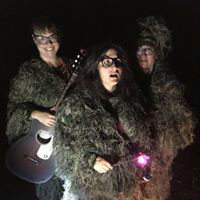Sophomore uses music to get through bad days and deal with emotions

Feature photo from Petrillo’s Facebook page. Adeline was influenced by her mother’s Kalamazoo based band.
April 14, 2020
“I think it is a really healthy way to process my emotions,” said sophomore Adeline Turner. “I am able to connect with parts of myself through music, and I have discovered a lot about myself through the artists that I enjoy.”
Turner was raised by musicians and has grown up enthralled in the music scene. She co-runs the Anatomize club with friend and fellow sophomore, Emma Atkinson, where they discuss the social, cultural, and political aspects of modern music. Music also largely affects how she feels and how she acts. This reigns true for many teenagers all over the world.
“I don’t really know how to describe it,” Turner started, “I have a lot of songs that I listen to, and I associate them with a specific mood. When I am sad, I don’t want to dig a deeper hole, so I will listen to uplifting or happy music to put me into a better mood. Or, if I have a personal dilemma, I will listen to music associated with the problem.”
On the website of The Magazine of the University of Central Florida, an article called “Your Brain on Music,” lists the many effects music can have on our brains. “Music can reduce stress, seizures, make you a better communicator, make you stronger, boost your immune system, assist in repairing brain damage, make you smarter and evoke memories.”
Music has a very large effect on where Turner is today. With both parents in separate rock bands, her mom performing with a band called Petrillo and her dad performing with his main band called Out, and most family friends involved in the music scene, she believes that it has molded her into the person she is today.
“I think the inspiration of music can influence things like lifestyle or fashion. My favorite musical artists have influenced the way I dress, the people I talk to, and how I act,” said Turner.
If not having grown up the way that she did, Turner’s life would be drastically different.
“My taste in music would not have been as tweaked and all over the place as it is now because my parents have introduced me to everything I like,” Turner explained.
Turner’s favorite artists include the band Slowdive, the rapper Choker, Roy Blair, The Cure, Lorde, and Jack Stauber. When walking in the halls, Turner always has her earbuds in, and although she doesn’t have an exact number, she estimates that her hours spent listening can range from four to six hours a day.
Many people around the world share Turner’s enthusiasm. In the article, “We Listen to Music for More Than 4 ½ Hours a Day,” found on the Marketing Charts website, a report made by Nielsen Music says that, “Americans are spending on average more than 4.5 hours a day listening to music.” This adds up to an average of around 32 hours a week.
Even though music plays such a large role in Turner’s life, she would not want to pursue it as a career
“I’ve definitely thought about it before,” Turner said, “but I think I would have to have started with an instrument at a younger age or really thrown myself into it. I find more peace when it affects me internally [music] than looking at it as a passion project.”
There are many highs and lows for Turner when it comes to music. For example, if she is having a bad day and listens to a song, it may ruin the song for her because she automatically associates the song with the bad day. On the other hand, the thrill of discovering an album is one of the many highs of music.
“There’s this album called ‘Souvlaki’ by Slowdive, and I remember at the beginning of freshman year, I had heard a song by them and, oh my gosh, it was so good,” Turner continued. “I remember wanting to listen to the entire album so I just sat in my room, in the dark, with my earbuds in and just listened to the whole thing.”
The album is still one of her favorites to this day. Music is something she was raised on, and now that she is older, she is able to understand the importance of the art.
“It was something I grew up with,” said Turner, “as I got older it became something that I could actually connect to rather than it just being a familiar ritual.”












